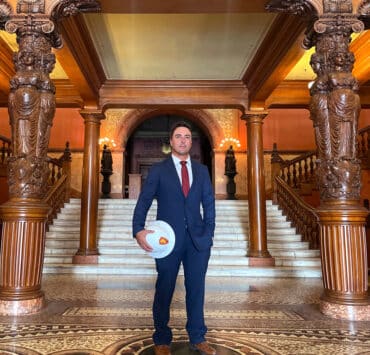|
Getting your Trinity Audio player ready...
|
Of all the industries directly impacted by the pandemic, fitness clubs were among the hardest hit. According to IHRSA, the global trade group serving the health and fitness industry, a full 25 percent of all health and fitness facilities had closed as of January 2022, almost two years after the term COVID-19 entered the public consciousness.
Home workouts, many based in apps and equipment-connected platforms, gained popularity in lieu of athletic clubs, both for convenience and to minimize contact with others. But Alder Partners, an independent franchisee of Planet Fitness, has had a different experience: the nationwide gym with more than 2,200 locations in the US has gained many new members since 2020.
The chain’s trajectory of success is credited to its facilities design, business model, and operational execution—before, during, and post-pandemic.
Kass McInnis is director of development for the Alder organization. Her purview is the establishment of new clubs and refurbishment of existing units in areas of Massachusetts and the Atlanta metro area, which currently totals 35 “high value, low price” locations. Her explanation for why Planet Fitness experiences such success is simple: “We have maintained a steadfast business model with few alterations to business operations, amenities, design, and construction.”
She adds that this consistency has provided stability and reliability across the board for both Planet Fitness members and franchisee developers who continue to expand the brand nationally and internationally, with a great relationship between the franchisees and the franchisor.
But these achievements still proved challenging. Like most businesses, Planet Fitness had to shut down its operations for several months in early 2020. With fixed real estate costs and payrolls to maintain, up against zero revenue from membership fees, the organization still managed to survive.
In fact, McInnis says even though the company did not always have members working out in its 20,000-square-foot facilities (the average size of Planet Fitness clubs), there were no permanent club closures due to the pandemic.
“The new member experience is a judgement-free offering that is an affordable health and wellness experience. The friendly club team members are focused on providing a clean-centric environment in the spacious clubs.”
Kass McInnis
“Weathering that storm put a strain on us,” McInnis says, adding that she made amicable arrangements with landlords who, in some cases, deferred rent until the pandemic eased. “As rent is one of the largest operating expenses for a portfolio of clubs, deferred rent payment agreements temporarily alleviated some financial burden for the company. This then allowed the largest segment of our business—operations—to turn their focuses to our staff.”
This way, McInnis says, Planet Fitness could focus on adapting to new in-club procedures, capacity monitoring, safe cleaning processes, and working out the social distancing equipment arrangements for when Planet Fitness clubs could reopen.
If Planet Fitness has an advantage over other segments of the club fitness market, it’s the size of those locations. Often in repurposed former “big box” stores, they are spacious locations that allow for social distancing and ventilation, key features that greatly reduce transmission of the coronavirus and other pathogens. This was always an advantage in attracting new members, McInnis says.
“A first-time visitor will ask, ‘Do I feel comfortable here?’ The open concept helps to provide this relief,” she adds. “The new member experience is a judgement-free offering that is an affordable health and wellness experience. The friendly staff are focused on providing a clean-centric environment in the spacious clubs.” This latter point is embedded in the Planet Fitness brand—to great success—differentiating it from the body-builder culture of traditional gyms.
Unlike other franchise organizations where the parent company owns the real estate, it’s the franchisee’s responsibility to lease or own the property. Which means that McInnis is very involved in the big-stakes game of site identification, a process she describes as “a combination of art and science.”
“Boots on the ground tenant/broker representation is also a key component to the sourcing of successful site selection,” McInnis elaborates. “We partner with real estate brokers that are well established and ingrained in our markets, and true real estate influencers who have strong relationships with the landlords, the developers, and the real estate investment trusts.” With that blend of people and information, her team can optimize where the organization finds new members while keeping costs in check.
When it comes to build-outs, the company works with preferred providers in architecture and engineering as vetted by the franchisor. McInnis says this is part of the consistency in facility standards that enables the brand and individual clubs to be successful.
Still, there is the matter of shifting consumer behaviors after almost two years of outside-of-clubs fitness experimentation. Planet Fitness developed a digital product, “On the Planet Fitness App,” which essentially provides over 1,000 in-home or gym video workouts with a tracking function to enhance the experience and results.
Corporation-wide, membership was at 16.2 million members as of March 31, 2022, higher than before the pandemic. As one Planet Fitness member told CO, a publication of the US Chamber of Commerce, “I do a lot of compound movements that require much heavier weight than I could have at home, and living in a small space doesn’t accommodate equipment.”
McInnis says her team was sufficiently confident that many segments of the market would return, such that Alder Partners added five locations during the pandemic. “Fitness isn’t just a trend,” she says. “We are a family-owned and operated group which entered the fitness industry with just one club in East Boston, Massachusetts, back in 1993.” When that gym was eventually converted into a Planet Fitness franchise location, owners realized the potential and value for not just that one but many more.
“Since 2011, we have been growing our portfolio of stores year over year while operating under the premise of customer-centric service for our members,” McInnis says, emphasizing that it’s about the relationships built with franchisors, landlords, and brokers, and the endless hours spent networking and establishing trust. “This is a company I’ve been so fortunate to be working with for many years. It is with gratitude that I can tell this story, and it is a story I just love to tell.”


